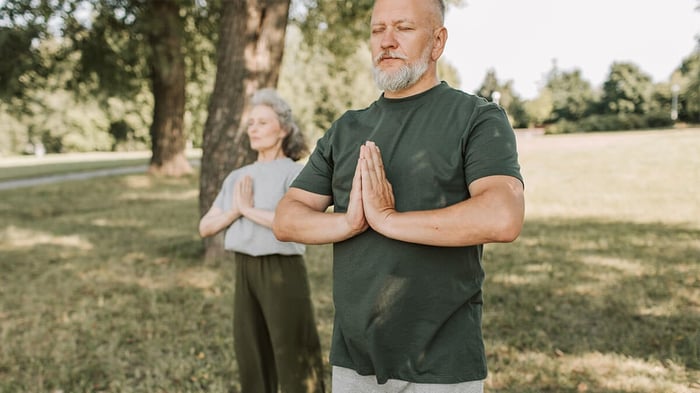Getting older is inevitable (or at least far better than the most common alternative) but ageing may not be. Ageing is defined as the changes to one’s mind and body as a result of getting older. As we reach ‘old age’, these are often negative: many people experience hearing loss, start to need to wear glasses, find themselves forgetful or less physically agile, and some experience more severe impacts, such as limited mobility.
Why does ageing happen?
Typically, the older you are, the more adverse effects you’ll experience from ageing. This is because over time your body accumulates damage, at a molecular and cellular level as well as from any stresses, injuries, illnesses or other conditions you might have. Like any system, there’s only so many knocks your body can take. However, while it was once thought that how you aged was down to genetics (which amounts to luck, as you can’t change your parents when you’re 90) it seems that genes may only account for a third of healthy ageing: the rest is down to lifestyle, environmental and other factors.
Can I affect my health in old age?
Yes, absolutely. While there are no guarantees, there are a number of steps you can take which increase the changes of you living longer and having more healthy, active years in later life. Below you’ll find several suggestions, all of which can offer benefits if you start now, whether you’re 19 or 90.
Identify your risk factors
Almost every disease and condition is easier to treat or manage if you find out about it early. There are a number of ways to improve your chances of spotting a problem early on. For example, you might talk to close relatives about any conditions that run in the family; attend routine screening appointments such as blood pressure monitoring or cancer screenings; or quit an unhealthy habit. Smoking, drug use and overconsumption of alcohol can be particularly damaging, but other lifestyle problems such as overspending, gambling or a high-stress lifestyle can also lead to mental or physical issues in later life.
Eat well most days

While the occasional treat won’t shorten your life, making sure your regular routine is right for you is a key way to build your long term health and wellbeing. Typically, older people need fewer calories, as they are less active, but may need more of certain nutrients. For example, calcium is used in building strong bones, so an increased intake may help people at risk of developing age-related bone problems, such as osteoporosis. While individual needs vary, as a general rule eating a range of foods, focussing on fresh and unprocessed ingredients, tends to provide a wide range of nutrients, while a diet that’s primarily processed or bulk manufactured foods (such as ready meals or restaurant foods) will tend to have a lower range of nutrients and higher levels of salt, fat and sugar than your body needs.
Targeted nutritional support
While a high-quality daily multivitamin can provide a nutritional boost for many people, as you age or identify particular risk factors in your genetic background or lifestyle, you may want to switch to a more tailored approach. Talk to your doctor as well as doing your own research about which nutrients, dietary changes or supplements might be most beneficial.
Keep exercising
A small change, such as going from an office job to working at home, kids being old enough to walk to school themselves or even a broken bike or uncomfortable walking shoes can be all that it takes for us to give up a chunk of exercise in our day. Being physically active has benefits at every stage of life and can reduce your risk of developing some life limiting conditions associated with ageing. A study in the British Journal of Sports Medicine suggests that staying fit can delay biological ageing by 10 years.
Don’t give up
As we age, we pass peak fitness or ability in a wide range of sports and activities, which is why pro footballers tend to retire in their thirties. While most of us won’t feel the effects in our professional lives until much later, if one is used to being an expert or topping the leader board at a hobby or sport, it can be tempting to quit entirely rather than take second place. Resist the urge! Dropping out of favourite activities can have negative physical and mental effects: many people don’t replace lost exercise minutes while others may suffer more from the loss of their community or social life. While it’s normal to reduce strenuous or risky activities such as marathon running, rock climbing or skiing moguls after a certain point, continuing with favourite activities in a lighter way provides physical and mental benefits.
Get the sleep you need

As we age, our sleeping patterns tend to shift. Many people say they need less sleep – but also, many people say they have a harder time falling asleep at night or suffer from insomnia. Maintaining a regular sleep schedule, including a fixed wake up time, can help with sleep problems. This can be counter-intuitive or seem unpleasant, particularly if you’ve recently retired or changed your work pattern so that you don’t need to be a martyr to the alarm clock.
It’s not just your weight, blood pressure or gym visits that counts
While we’re conditioned to expect ageing to be a physical and mental decline, if you’re experiencing a symptom or change that worries or upsets you, speak to a health care professional rather than suffering in silence. This is particularly true if you feel you are otherwise healthy ‘for your age’ and shouldn’t ‘make a fuss’. Many health problems show their earliest signs in small physical changes, and many embarrassing or uncomfortable symptoms, such as incontinence, can be treated. Being kind to yourself and taking care of your physical and mental wellbeing so you can enjoy your life is perhaps the ultimate goal of healthy ageing.


